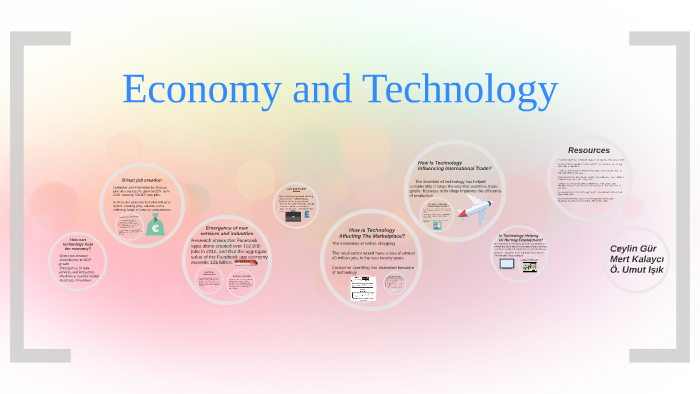Technology Affect The Economy

Technology has a profound impact on the economy, influencing various aspects of production, consumption, employment, and economic growth. Here are some ways technology affects the economy:
Increased Productivity: Technology enhances productivity by automating tasks, streamlining processes, and improving efficiency in production and service industries. This leads to higher output per unit of input (e.g., labor, capital), driving economic growth and competitiveness.
Innovation and Entrepreneurship: Technology fuels innovation and entrepreneurship by enabling the development of new products, services, and business models. Entrepreneurs leverage technology to create disruptive innovations, enter new markets, and challenge established industries, fostering economic dynamism and job creation.
Globalization: Technology facilitates globalization by connecting businesses, markets, and supply chains worldwide. E-commerce platforms, digital communication tools, and transportation technologies enable companies to reach global markets, access new customers, and collaborate with international partners, leading to increased trade and economic interdependence.
Labor Market Dynamics: Technology influences labor market dynamics by reshaping job roles, skills requirements, and employment opportunities. Automation and AI technologies may eliminate certain routine and low-skilled jobs while creating new roles that require higher levels of technical expertise, creativity, and problem-solving skills. This can lead to structural changes in the labor market and require investments in workforce development and retraining programs.
Income Inequality: Technology contributes to income inequality by favoring skilled workers with specialized technical skills and education. The digital divide, disparities in access to technology, and unequal distribution of economic gains from technological advancements can exacerbate income inequality and socioeconomic disparities within societies.
Disruption of Traditional Industries: Technology disrupts traditional industries and business models by enabling new entrants, innovative startups, and digital platforms to challenge incumbents. Industries such as retail, transportation, media, and finance are undergoing digital transformation, leading to market disruptions, industry consolidation, and shifts in consumer behavior.
Creative Destruction: Technology promotes creative destruction, a process where new technologies replace outdated ones, leading to the obsolescence of existing products, services, and industries. While this process can lead to short-term disruptions and job displacement, it also fosters long-term innovation, productivity gains, and economic renewal.
Infrastructure Investment: Technology drives investment in digital infrastructure, including broadband networks, data centers, and digital platforms, which are essential for supporting economic activities in the digital age. Governments and businesses invest in digital infrastructure to improve connectivity, promote innovation, and enable digital inclusion for all citizens.
Knowledge-Based Economy: Technology transforms economies into knowledge-based economies, where the creation, dissemination, and application of knowledge are central drivers of economic growth. Investments in research and development (R&D), education, and human capital development are critical for fostering innovation, competitiveness, and sustainable economic development.
Regulatory and Policy Challenges: Technology presents regulatory and policy challenges related to privacy, cybersecurity, intellectual property rights, antitrust, and ethical considerations. Governments and regulatory authorities need to adapt regulatory frameworks and policies to address emerging challenges and ensure that technological advancements benefit society as a whole.
Overall, technology is a powerful driver of economic change and transformation, shaping the way economies evolve, industries operate, and individuals participate in the global economy. Embracing technology and leveraging its potential while addressing its challenges are essential for promoting inclusive, sustainable, and equitable economic development.
Thank you,